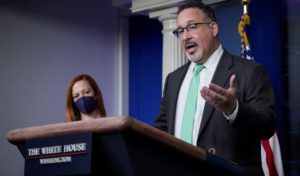
President Biden announces student loan forgiveness, a federal judge blocks HHS abortion guidance, and more…
IN THE NEWS
- President Joseph R. Biden announced a relief package for over 60 million student loan borrowers. The package cancels up to $10,000 in student debt for borrowers making less than $125,000 and up to $20,000 in relief for Pell Grant recipients. President Biden also directed the U.S. Department of Education to extend the pause of federal loan repayment “one final time” through year’s end as well as to cap monthly payments toward undergraduate loans at 5 percent of a borrower’s monthly income and issue rules to amend the Public Service Loan Forgiveness program. Economists at the Committee for a Responsible Federal Budget argued that the action undermines the national debt-reduction and deflationary effects of the Inflation Reduction Act, while the Student Borrower Protection Center highlighted that the move helps close the racial and gender wealth gap.
- A federal judge in Texas ordered that the U.S. Department of Health and Human Services could not enforce guidance that aimed to remind doctors that they are obligated to provide abortions for emergency medical situations. The guidance, issued in the aftermath of the Dobbs v. Jackson Women’s Health Organization decision, reinforced the Emergency Medical Treatment and Labor Act (EMTALA), urging that physicians “must” provide an abortion, regardless of state law, if the physician deems it necessary to stabilize an emergency medical condition. The district judge reasoned that the guidance extends too far beyond EMTALA authority. Meanwhile, a federal judge in Idaho blocked some enforcement of a state law banning all abortions except in cases involving rape, incest or when a woman’s life is in danger. The judge concluded that the Idaho law conflicts with provider obligations under EMTALA.
- A Michigan state trial court judge issued a preliminary injunction blocking county prosecutors from enforcing the state’s abortion ban. The law, initially enacted in 1931, bans all abortions not necessary to save the life of the mother and does not provide exceptions for instances of rape or incest. Governor Gretchen Whitmer brought the suit, asking the state supreme court to clarify whether the state constitution protected the right to an abortion. Whitmer stated that confusion surrounding the law was not fair “for women who deserve certainty about their health care.” Other states have also established abortion-related measures this week. Tennessee implemented a law banning all abortions not necessary to save the life of the mother, and Texas increased the penalty for those who preform an abortion when the mother’s life is not at risk to a first degree felony charge.
- The U.S. Supreme Court temporarily reinstated a federal district court’s ruling requiring that Georgia postpone its election for seats on the state Public Service Commission, which regulates public utilities. Although each of the commission’s five members represents one district, the entire state votes to elect all of the commissioners. A federal district judge in Georgia ruled that a statewide election system violated Section 2 of the Voting Rights Act by diluting the power of the state’s majority-Black district. A federal appellate court had reversed the district court’s decision on the basis of the Purcell principle, which says that federal courts should not change election rules prior to an upcoming election. The Supreme Court sent the case back to the appellate court, ruling that the lower court must justify its decision on a basis other than the Purcell principle.
- A U.S. Department of Justice rule that subjects homemade firearm kits used to build ghost guns to the same regulations as traditional guns went into effect. The new regulation requires manufacturers to add serial numbers to ghost guns, buyers of these kits to undergo background checks, and dealers to comply with licensing and recording requirements. A federal judge in North Dakota rejected a lawsuit seeking to prevent the Justice Department from implementing the new restrictions. U.S. Attorney General Merrick Garland stated that the new rule “will make it harder for criminals and other prohibited persons to obtain untraceable guns.”
- The U.S. Environmental Protection Agency (EPA) proposed a rule that would amend a program that requires industrial facilities to manage and prevent the release of hazardous chemicals into the air of surrounding communities. The amendments would reinstate stricter requirements, such as third-party audits, on facilities with high accident rates and make hazard information more accessible to the public. In 2019, the Trump Administration removed these provisions, citing concerns with the cost of the program and the security risks created by the disclosure requirements. EPA Administrator Michael S. Regan explained that the proposed rule would strengthen public health protections, particularly for “vulnerable communities” that are “disproportionately impacted by these facilities.”
- The California Air Resources Board issued regulations to restrict and ultimately ban the sale of new gasoline cars by 2035. The board’s rule, which was first announced by California Governor Gavin Newsom in 2020, requires 35 percent of new cars to be zero-emission vehicles beginning in 2026. This quota would increase each year to 100 percent by 2035. California moved forward with its regulations due to the Biden Administration’s reinstatement of a Clean Air Act waiver, which authorized California to adopt stricter emission standards than EPA and which was revoked under the Trump Administration. Bob Holycross, Ford’s Chief Sustainability Officer, commented that the new rule is a “landmark standard that will define clean transportation and set an example for the United States.”
- Governor Newsom vetoed legislation that would have created safe injection sites, facilities across the state where people can use illegal drugs with sterile supplies under medical supervision. The bill was expected to allow San Francisco, Los Angeles, Los Angeles County, and Oakland to set up injection facilities in communities struggling with overdoses and frequent drug use. State Senator Scott Weiner, the bill’s author, described Governor Newsom’s veto as “tragic” and “a major setback for the effort to save lives and connect people to treatment.”
WHAT WE’RE READING THIS WEEK
- In a Brookings Institution essay, Anika Singh Lemar, a nonresident senior fellow at Brookings, arguedthat zoning regulations that require public participation impede the development of affordable housing. Lemar explained that because developers seeking zoning approval must go through public hearings, they face greater uncertainty and risk than they would if seeking approval from a more objective or standardized local agency. Lemar asserted that letting “angry neighbors” reject a project that follows state and local laws stifles development. Instead of the current process, Lemar proposed that zoning boards should engage the local community proactively by allowing the public to help develop standardized zoning rules.
- In a forthcoming Brigham Young University Law Review article, Kimberly Kessler Ferzan, a professor at University of Pennsylvania Carey Law School, argued that the time-served model, a practice that gives criminal defendants time off of their sentence for the time they spent in pretrial detention, is harmful and should be abandoned. Ferzan discussed how time served provides no benefit to low-income innocent people who are detained and then found not guilty. Time served, according to Ferzan, also allows states to avoid the additional costs of pretrial detention since these days count against a sentence the state would have to pay for anyway. Instead, the costs fall on the detained individuals and their families. Ferzan recommended moving to a compensation model, according to which innocent and guilty defendants are financially compensated for their time spent in pretrial detention.
- In a Center for American Progress report, Jared C. Bass, senior director at American Progress, explored how the federal government should address the student debt crisis. Bass argued that to prevent the need for future student loan relief, Congress must expand aid programs, such as Federal Work-Study and Pell Grants, and create incentives for higher education institutions to limit rising tuition costs. Bass also urged Congress to help student borrowers who will still have debt after the Biden Administration’s cancellation plan, specifically recommending the reform of interest rates and the removal of the punitive effects of default.
EDITOR’S CHOICE
- In an essay in The Regulatory Review, Luke Herrine, an assistant professor of law at the University of Alabama School of Law, argued that the Education Department had the authority to cancel a substantial amount—if not all—of student loan debt. Herrine asserted that a lack of “political will” is the only thing stopping the Education Department from canceling its student loan portfolio. Herrine explained that, under the Higher Education Act of 1965, the Education Department has the power to compromise, waive, or release any right “to collect on student loans,” although historically it has only used this power under extreme circumstances for those who have been unable to pay off their student loans for a significant period of time.



